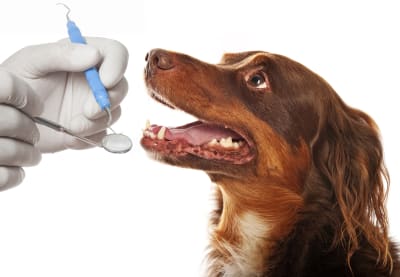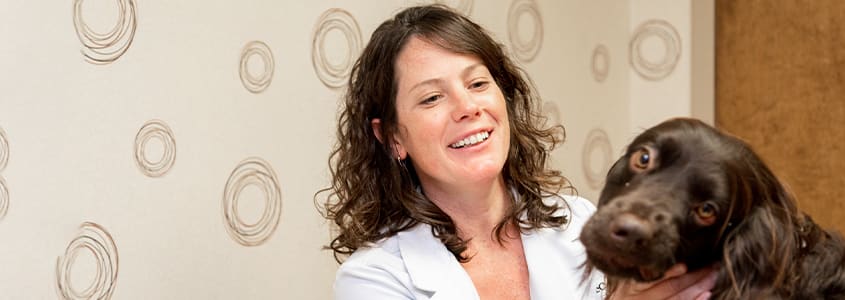Why does my dog need a professional teeth cleaning?
Just like their human’s, a dog’s dental health is closely related to his overall physical health and wellbeing. Unfortunately, periodontal disease is common among dogs even within their first few years. This can lead to dire negative consequences for their health.
While maintaining an at-home oral care routine (and potentially supplementing it with dental chews or treats) is important in that it helps keep plaque and tartar buildup in check, seeing the vet regularly for a professional cleaning is the best way to ensure your dog’s mouth stays clean and healthy.
Without this annual cleaning, teeth can become covered with plaque, which leads to bad breath, gingivitis and eventually periodontal disease that in its severe forms, can result in tooth loss. This can also have severe consequences for your pup’s overall health, as periodontal disease may lead to heart disease (when bacteria enters the bloodstream through the mouth, it can infect other organs).
What happens during a professional teeth cleaning?
We recommend booking an annual dental checkup for your pooch. You may need to bring them in more frequently if they are prone to dental problems.
Your veterinarian will perform an oral health evaluation, looking for signs of dental problems, including:
- Plaque or tartar buildup
- Bad breath
- Swelling, pain, or bleeding in or around the mouth
- Discolored teeth
- Loose or broken teeth
- Extra teeth or baby teeth that have been retained
You can also take this opportunity to let your vet know if you’ve noticed any symptoms such as drooling, dropping food from the mouth, reduced appetite (which could indicate your dog is experiencing pain in his teeth), or abnormal chewing.
Your vet will also determine whether your pet is healthy enough for anesthesia, then perform additional diagnostics if required. Once we have safely anesthetized your pet, we complete a full oral exam (tooth-by-tooth) and charting.
While they are safely under anesthesia, their teeth will be cleaned and polished (in addition to their gum line). The vet will probe and radiograph each tooth, then apply a fluoride treatment before using a dental sealant to fight plaque. If we find advanced periodontal disease, a custom treatment plan will be created and we’ll review it with you.
How can I keep my dog’s teeth clean?
Pooch parents play an important role in helping their dogs fight the battle against dental disease. Here are some tips for maintaining your dog’s oral health:
- Make daily brushing a part of your dog’s oral health routine. Use a finger brush to remove any plaque or debris from their teeth.
- Use a plaque prevention product (ask your vet for trustworthy recommendations) that you can apply to your pet’s gums and teeth. These products help prevent plaque buildup.
- Give your furry friend dental treats, food or chews designed to help keep plaque buildup and tartar away.
Dental care is an essential element of your pet’s overall physical health. Schedule your dog’s annual dental appointment today - your pooch will be grateful!
Is your dog due for an annual dental appointment? Our Greensboro vets can check your pet's health to ensure his teeth are in good condition. Book an appointment today.
Looking for a vet in Greensboro?
We're always accepting new patients, so contact our veterinary hospital today to book your pet's first appointment.
Related Articles View All
What happens during a routine pet exam?
Routine wellness exams are a proactive way to help safeguard your pet's long-term health and vitality. Why should you take your healthy pet to the vet? What happens during a pet health wellness exam? Find out.
How much does an emergency vet visit cost?
Emergency veterinary care can be costly, but planning ahead allows you to make decisions about your pet's care based on their needs rather than financial restrictions. Today, we look at the cost of emergency vet care, and how to be ready if your pet needs emergency treatment.
Kidney Failure in Dogs
Chronic and acute kidney failure are serious health problems commonly seen in dogs. Here, you will learn about the differences between chronic and acute kidney failure in dogs, the signs to watch for and how these conditions are treated.
Signs of Bladder Infections in Dogs & How They Are Treated
Many dogs suffer from bladder infections and other issues affecting the urinary tract system. What causes bladder infection in dogs? What signs should you watch for? How do vets treat bladder infections in dogs? Read on to find out.


